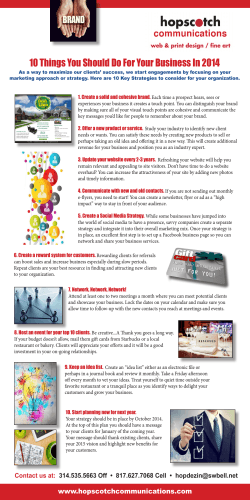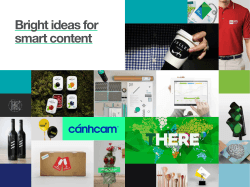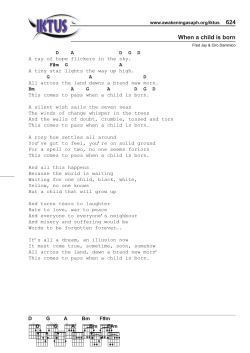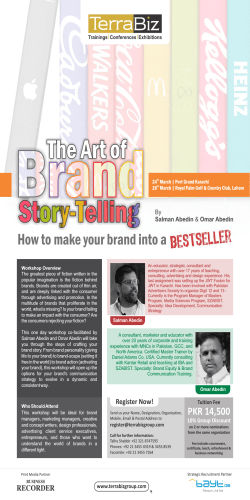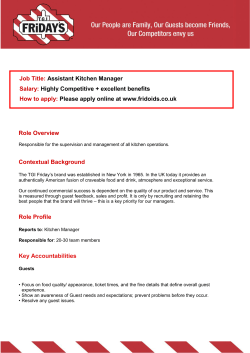
Product Decisions Chapter 10
Product Decisions Chapter 10 What is a Product? Marketing Mix: Product “Anything that can be offered to a market to satisfy a need or want” Marketing Mix: Product A product is a ... • Good Marketing Mix: Product A product is a ... • Service Marketing Mix: Product A product is a ... • Event Marketing Mix: Product A product is a ... • Experience Marketing Mix: Product A product is a ... • Person Marketing Mix: Product A product is a ... • Place Marketing Mix: Product A product is a ... • Idea Concordia Children’s Services If you don’t help feed them, who will? Marketing Mix: Product Product Types 1 Durable Goods 2 Nondurable Goods Durability tangibility Services Disposable Marketing Mix: Product Consumer Goods Industrial Goods Brands • Anything that help you to identify and to differentiate your goods or services from those of competitors. • A variety of brand elements to enhance brand awareness or facilitate the formation of strong, favorable, and unique brand associations: – – – – – – Brand Name Logo Symbol Character Packaging Slogan Brand Equity • The added value that accrues to a product as a result of investments in the marketing of the brand • An asset that represents the value created by the relationship between the brand and customer over time Brand Equity • extent to which a consumer holds strong, favorable, and unique associations with a brand in memory • extent to which s/he is willing to pay more for the branded version of a product than for a nonbranded (generic) version 6-14 Brand Equity Benefits • • • • • • • Greater loyalty Less vulnerability to marketing actions Less vulnerability to marketing crises Larger margins More inelastic consumer response to price increases More elastic consumer response to price decreases Increased marketing communication effectiveness Local Products and Brands Coca-Cola Sokenbicha • Brands that have achieved success in a single national market • Represent the lifeblood of domestic companies • Entrenched local products/brands can be a significant competitive hurdle to global companies International Products and Brands • Offered in several markets in a particular region – ‘Euro-brands’ – Honda 5-door hatchback auto is known as Fit in Japan and Jazz in Europe Global Products and Brands • Global products meet the wants and needs of a global market and are offered in all world regions • Global brands have the same name and similar image and positioning throughout the world In any language Gillette’s trademarked brand promise is easy to understand. Global Products and Brands “A multinational has operations in different countries. A global company views the world as a single country. We know Argentina and France are different, but we treat them the same. We sell them the same products, we use the same production methods, we have the same corporate policies. We even use the same advertising—in a different language, of course.” - Alfred Zeien Former Gillette CEO Global Brand Characteristics • Quality signal—allows a company to charge premium price in a highly competitive market • Global myth—marketers can use global consumer culture positioning to link the brand identity to any part of the world • Social responsibility—shows how a company addresses social problems Global Products and Brands • Global brands are not the same as global products – iPod = brand – mp3 player= product Which of the following statements is not an example of local products or brands? A) Coca-Cola developed several branded drink products for Japan. B) Coca-Cola markets Kinely brand bottled water in India. C) BMW uses "the ultimate driving machine" slogan in India. D) Diageo PLC markets Gordon's Edge, a gin-based readyto-drink beverage in the United Kingdom. E) Coca-Cola developed a noncarbonated, ginsengflavored beverage for Japan. Branding Strategies • Combination or tiered branding allows marketers to leverage a company’s reputation while developing a distinctive identity for a line of products – Sony Walkman • Co-branding or dual branding features two or more company or product brands Brand Extension • Brand acts as an umbrella for new products – Example: The Virgin Group • • • • • Virgin Entertainment: Virgin Mega-stores and MGM Cinemas Virgin Trading: Virgin Cola and Virgin Vodka Virgin Radio Virgin Rail (UK only) Virgin Media Group: Virgin Publishing, Virgin Television, Virgin Net (UK only) • Virgin Hotels • Virgin Travel Group: Virgin America Airways, Virgin Holidays, Virgin Galactic Around the world, various brands of personal computers are sold with Pentium processors. This fact is often used as a selling point, with advertising that proclaims "Intel Inside." Which branding concept does such advertising reflect? A) brand equity B) co-branding C) brand image D) brand extension E) tiered branding World’s Most Valuable Brands, 2010 Global Brand Development • Questions to ask when management seeks to build a global brand: – Does this move fit the company and/or its markets? – How difficult will it be to develop a global brand team? – Can a single brand be imposed on all markets successfully? Global Brand Development 1. Create a compelling value proposition 2. Think about all elements of brand identity and select names, marks, and symbols that have the potential for globalization 3. Research the alternatives of extending a national brand versus adopting a new brand identity globally 4. Develop a company-wide communication system Global Brand Development 5. Develop a consistent planning process 6. Assign specific responsibility for managing branding issues 6. Execute brand-building strategies 7. Harmonize, unravel confusion, and eliminate complexity Local versus Global Products and Brands: A Needs-Based Approach Maslow’s Hierarchy of Needs Country of Origin as Brand Element • Perceptions about and attitudes toward particular countries often extend to products and brands known to originate in those countries – Germany – France – Italy French perfume Packaging • Consumer Packaged Goods refers to products whose packaging is designed to protect or contain the product during shipping, at retail, or point of use • Eco-Packaging is key because package designers must address environmental issues • Offers communication cues that provide consumers with a basis for making a purchase decision Labeling • Provides consumers with various types of information • Regulations differ by country regarding various products – Health warnings on tobacco products – American Automobile Labeling Act clarifies the country of origin, and final assembly point – European Union requires labels on all food products that include ingredients from genetically modified crops – US COOL requires supermarkets and other food retailers to display information that identifies the country that meat, poultry, and certain other food products come from Global Product Planning: Strategic Alternatives Product Invention • Strategy 5: – Important for reaching mass markets in less industrialized nations and certain segments in industrialized countries • Hand-cranked radios for areas with no electricity How to Choose a Strategy? • Two errors that management makes in choosing a strategy – NIH (Not invented here) syndrome means managers ignore the advancements of subsidiaries overseas – Managers impose policies upon subsidiaries because they assume what is right for customers in one market is right in every market How to Choose a Strategy? • The product itself, defined in terms of the function or need it serves • The market, defined in terms of the conditions under which the product is used, preferences of potential customers, and ability to buy the product • Adaptation and manufacturing costs the company will incur Prior to 2004, Nokia launched different cell phone products in different countries at different times. Nokia also used different advertising images and messages in different countries. Which approach to the world marketplace was Nokia using? A) product-communications extension B) product extension-communications adaptation C) product adaptation-communications extension D) product-communication adaptation E) product invention Before Ben & Jerry's launched their ice cream in the United Kingdom, the company conducted extensive research to determine whether the package design was appropriate. The research indicated that British consumers perceived the colors differently than U.S. consumers. The package design was changed accordingly. This type of strategy can be defined as: A) product-communications extension. B) product extension-communications adaptation. C) product adaptation-communications extension. D) product-communication adaptation. E) product invention. Colgate's Total is a new toothpaste brand whose formulation, imagery, and consumer appeal were designed from the beginning to translate across national boundaries. Which strategy did Colgate use with Total? A) product-communications extension B) product extension-communications adaptation C) product adaptation-communications extension D) dual adaptation E) product innovation Dry soup mixes that have long been popular in Europe are marketed as sauces or dips in the U.S. This is an example of the ________ strategy. A) product-communications extension B) product extension-communications adaptation C) product adaptation-communications extension D) dual adaptation E) product invention
© Copyright 2026
